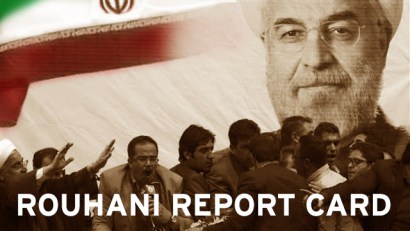Editor’s Note: This is the first in a five-part SERIES assessing the track record of Iranian President Hassan Rouhani, marking his first year in office. Read an examination of his foreign policy here, domestic policy here, and economic policy here.
A year ago today, Hassan Rouhani was sworn in as president of the Islamic Republic of Iran, having unexpectedly won a slim majority of votes in the country’s June 2013 ninth presidential elections. As Rouhani completes his first year on the job, Iran @ Brookings begins a week-long series examining the impact of his presidency to date, with assessment of his track record on issues related to Iran’s foreign policy, its politics, its economy, and its society and culture.
Rouhani’s election astonished observers in Iran and elsewhere — and even, by some accounts, the candidate himself. Four years after a disputed presidential election provoked mass protests and regime violence, most expected the ballot to serve as an investiture of another hard-line stooge and a further abrogation of the Islamic Republic’s modest guarantees of political participation. Rouhani upended those expectations with a shrewd campaign that showcased the candidate’s uncanny ability to appease the establishment while appealing to public dissatisfaction to it.
His victory sent thousands of Iranians into the streets, this time not to demonstrate but to celebrate. They were elated at the prospect of a president who sought to resolve Iran’s problems rather than inflame them and who emphasized rationality rather than religion. Rouhani managed to win approval for a dream team cabinet of technocrats and became something of a social media sensation through carefully curated tweets and an inaugural address refashioned into an Obama-style music video. In the wake of a decade of creeping isolation and suffocating economic pressures, it seemed that the revolutionary state had pulled itself back from the precipice, not for the first time.
However, the transition from electoral sensation to successful executive has been a rocky one for Rouhani. To his credit, he can claim responsibility for several important breakthroughs, including an unprecedented direct bilateral conversation with his American counterpart and the signing of an interim accord that infused new momentum into the long-stalled nuclear diplomacy. And he made early progress in vital areas, particularly by instituting more responsible economic policies that have tempered inflation.
Still, it remains unclear if the president can be as effective in advancing his ambitious agenda as he was in selling his message of hope and prudence on the stump. The Rouhani tsunami has run into Iran’s enduring realities: a system stuck in an antiquated ideology; power concentrated in the hands of a few; and a region beset with threat and opportunity.
As a result, the very issues that he campaigned upon — a resolution to the nuclear impasse and an unravelling of the sanctions regime that has devastated Iran’s economy — appear to be in genuine jeopardy. Rouhani is not the decision maker on the nuclear issue, but his presidency will rise and fall on its fate. The death of any hopes for a deal would end any prospects for advancing his broader agenda.
Over the course of the subsequent four days, Iran @ Brookings will take on each dimension of that agenda, beginning with foreign policy as the central plank in Rouhani’s platform, and assess the progress to date and the prospects ahead.
What is clear after this first year is that Rouhani was always something less than what his most effusive fans hoped — he is an instrument of systemic rebalancing rather than an agent of social change. But his surprising success in achieving a durable and meaningful first step toward ending the nuclear impasse proved his sharpest critics equally wrong. Ultimately, the verdict on Rouhani’s presidency, and on the future of Iran, will be shaped by what happens over the course of his second year in office.
The Brookings Institution is committed to quality, independence, and impact.
We are supported by a diverse array of funders. In line with our values and policies, each Brookings publication represents the sole views of its author(s).




Commentary
Rouhani’s Rocky First Year: A Report Card
August 4, 2014